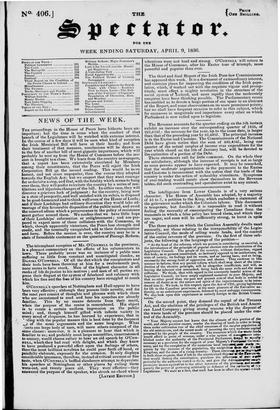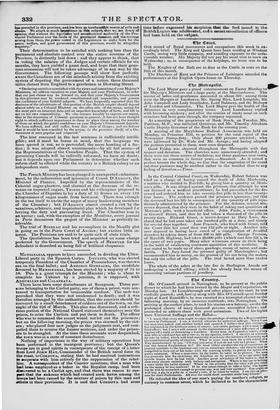The intelligence from Lower Canada is of a very serious character. The House of Assembly has adopted, by a majority
of 55 to 7, a petition to the King, which embodies a statement of the grievances under which the Colonists labour. This document is temperate, but forcible : it is impossible to read it without feeling the necessity of emancipating the Canadians from the trammels in which a false policy has bound them, and which they are eager, and soon will be sufficiently strong, to burst in spite of us.
The three points on which the Canadian Assembly dwells most earnestly, are those relating to the irresponsibility of the Legislative Council, the mode of selling waste lands, and the control of the entire revenue of the province. On the first of these subjects, the following is the language of the petition— At the head of the reforms, which we persist in considering as essential, is the introduction of the principle of popular election into the constitution of the Legislative Council. The people of the country, without distinction, regard this body, as at present constituted, as factiously opposed to its institutions, its state of society, its feelings and its wants, and as having been, and as being, necessarily the strong-hold of oppression and abuses. They continue in like manner to believe, that any partial reform which shall stop short of the introduction of the elective principle, will be altogether insufficient, and will, as leaving the inherent vice untouched, bring back the same evils and the same collisions. We think, that with regard to the constantly baneful action of the Legislative Council, we have amply explained ourselves to your Majesty, and that no other proof than the past and present acts of that body is needed to remove all doubt as to the nature and spirit of the improvements to be introduced into it. We look, in this respect, upon the Act of 1791, giving legislators for life to the Canadian provinces, at the mere pleasure of the Executive au. thority, as an unfortunate experiment, followed by-most unhappy consequences. We also look upon this experiment as entirely foreign to the British Constitution."
On the second point, they demand the repeal of the Tenures Act, and the abolition of the privileges of the British and American Land Company; giving strong reasons why the disposal of the waste lands of the province should be placed under the control of the Assembly.
" Your Majesty cannot but know that the climate of this portion of the world, and other peculiar causes, render the clearing of lands in order to bring them under cultivation one of the chief resources of the surplus population of the old settlements, and the surest mode of investing the very moderate capital possessed by the people of the country,. The resources which the waste land* would afford in point of revenue, under a wise system of niseuent esta blished under the authority of the Provincial Parliament, Ye squally 7. necessary as a provision for the support of your Majesty's Prseiosil Govere-. ment, and for the completion of the numerous local impresagjess anawis quisite by the increase of the population, the emigratioe &ea sta Kingdom, and the state of a rising country. These resoure. aim sit imports*. in both these respects, that if left to the unrestrained dispsaJSLsroscussuilly they would destroy the constitution, purchase the adheres,* a all a 11 Odg powerful by the authority vested in them, and give the Atliniaajetroten aesiple pecuniary means equivakrit to the other revenues of the provisos, mad ewe* quently the power of governing arbitralily in defiance of the authority et ti.e Legislature. We state as a fact, that such has been in effect the swain hich has prevailed in this province, and has been an inexhaustible source .(evils sod abuses. We attach so much importance to this subject, that we are firmly of opinion, that without the legislative and constitutional authority of the Pro • incial Parliament over the lands of the provincial domains, and the revenue arising from them, the power vested in the Legislature to make laws for the peace, welfare, and good goveinment of this province, would be altogether nugatory."
Their determination to be satisfied with nothing less than the permanent and absolute control over the entire revenue of the Province, is distinctly laid down ; and they appear to think, that in voting the salaries of the Judges and certain officials for six months, they have yielded a great deal, and hope that their generous concession will not be taken advantage of in any way by the Government. The following passage will show how perfectly aware the Canadians are of the mischiefs arising from the existing system of deputing the government of a nation three thousand miles distant from England to a gentleman in Downing Street.
"Declaring ourselves unsatisfied with the views and intentions of your Majesty's Ministers, we address ourselves to your Majesty and your Parliament, in order that our just claims may be listened to, and that your Majesty's Government in this province may be rendered constitutional and responsible, and possess she confidence of your faithful subjects. We have frequently regretted that the destinies of the inhabitants of this portion of the British empire should depend almost solely on a Colonial Minister on the other side of the ocean, acting for the most part on incorrect data and an imperfect knowledge of facts, and left to set on his own responsibility. We also venture humbly to express our regret, that in the discussion of Colonial questions in general, it has not been thought Tight to attach sufficient importance to them to place them among the number of those on which the public confidence on your Majesty's Government depends. We have suffered, and still suffer, from this state of things ; and we believe that it would be best remedied by the action, in the province itself, of a Government at once popular and respected."
The hint conveyed in the last sentence is sufficiently intelligible; and it must be borne in mind, that the language we have quoted is not, as is pretended, the mere howling of a faction; it was adopted almost unanimously—by all but seven—of the Representatives of the Canadian People. That the system of governing Canada will be radically reformed, we have no doubt ; but it depends upon our Parliament to determine whether such reform shall be effected while the country is a British colony or an independent state.



























 Previous page
Previous page